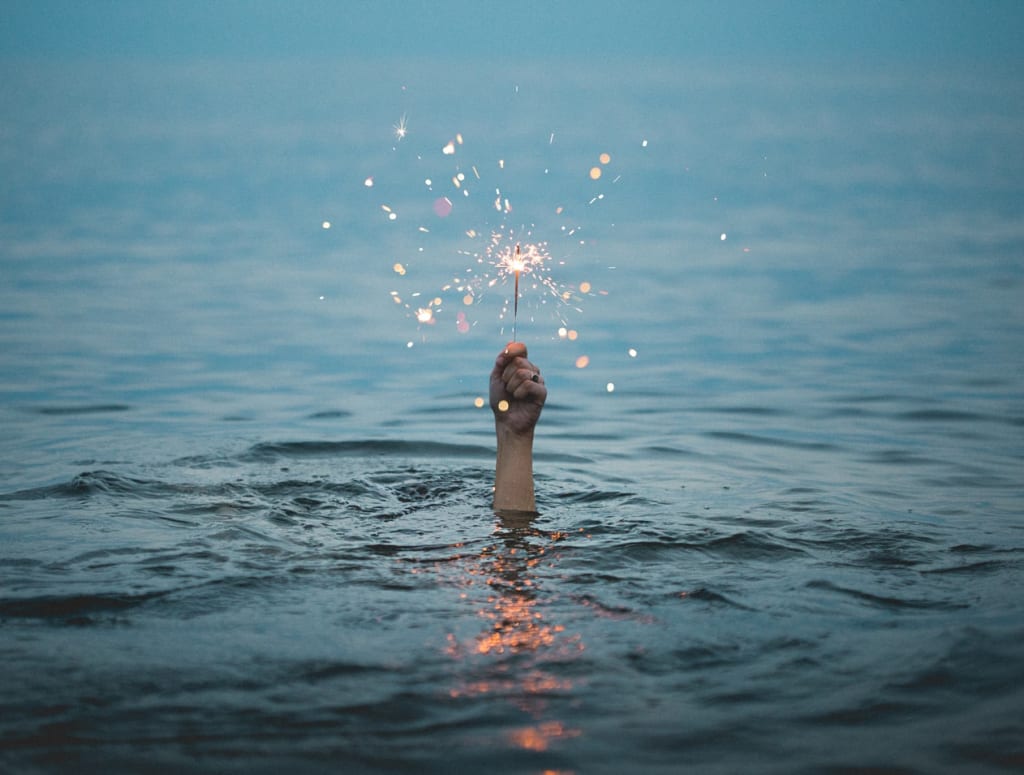Remnant
Upon shattered shores.

A flicker of light. It glints again. Spectral, rainbow, refracted off oil-slicked water. It behaves mischievously, prancing one way, then another, back and forth in a thousand undulations.
The child stares with curious intent. In one hand a length of pipe, perhaps a trolley handle, perhaps just pipe. Bent wire weaving between the fingers of the other. But for a moment her scrounging has been halted at sight of the mirage dancing before her. It is a gift, and tragedy, she doesn’t understand.
The wash of choked tide licks her little toes. Countless shards of plastic and foam. If she dug her feet any deeper then broken glass would certainly hack at them. The shore is littered with a half century's worth of refuse. Probably more. Growing and growing. Sand particles now plastic. Shadows in place of shells.
The girl breaks her gaze, back to scouring the debris again, searching. She is six. Maybe seven. Determined. Yes, so very determined. A photograph, dog-eared, poking from her tiny pocket. An old snorkel mask around her neck. The strap fatigued and cracked. The glass scratched and foggy. No amount of polish would do much for them.
There is so much junk here. A scavenger’s stretch. The gulls of humanity picking through it for kilometres ahead. Perhaps they’ll stumble upon a few treasures. Some circuit boards or copper cable. Scrap worth a few dollars.
The girl’s eyes startle. She has turned over an old surfboard. The underside is carved by the trash it’s been dragged across. But her eyes aren’t on the board. She hasn’t seen a surfer. She doesn’t know what one is. At last, though, she finds what she was looking for. A smile stretching early on her freckled cheeks. Her salted lips curling in the morning air. A mass of tangled netting in her palms. It is old too. No one uses nets anymore.
Carefully she unravels a nylon strand, tying the bent wire and pipe to opposite ends. A meticulous task for her tiny fingers, but she has become a practised hand at this. A skill self-taught over the last few visits.
With her feet proudly planted on an old piece of plywood she finally hurls the strand out. This was something she has seen before.
First, a bottle.
Second, a sandal.
Third, a dead bird. Part of one anyway.
She sighs.
Her catch piles higher. The piece of bent wire a makeshift hook. Even with only fifteen feet or so of her line, the low waves are yielding countless bites. Higher and higher. Junk that will be reabsorbed by the waves in a few hours, then liberally distributed back along the coastline. A pattern of consumption and regurgitation reshaping this landscape with each tide. A ‘wastescape’ she has heard it called.
“Are you being careful?” Her mother shouts from back behind the dunes. Up where the water doesn’t wet her feet and the wind won’t pull at her jacket.
The girl won’t answer. She isn’t supposed to. That she has learned. A question meant as instruction. They have been here five days now, the place her mum had once come to. Down here, as long as she is quiet, she is allowed to stay. If she makes too much noise her mum will get nervous.
At school she had learned about waste, but it never looked like this. The posters had bottles and chip packets, old shoes and toy dinosaurs. This was just flakes of colour, ‘the shredded remains of capitalism,’ her mum said. The girl didn’t know what that meant but still she nodded with affirmation. Plastic. Always plastic. The way people said it now made the girl reluctant to utter the word. Like it was something naughty, bad, awful.
There were still bits and pieces of things. She liked the idea of bits and pieces. Just the phrase. What was a bit and what was a piece though had become a question quite confusing. How to classify these had filled quite a few hours of thought down here. There were so many strange things. Broken things. Things she knew no name for, things as curious and useless as the hundred before them. She tried picking some up last time to put in the bin back at home but had cut her fingers. Her mum didn’t want her doing it after that. Her mum would have preferred she help with the scavenge behind the dunes. Back where the junk wasn’t so deteriorated. Where recognition was still possible. She had only wanted the girl to walk on the rocks, not junk. Instead, her mum now tried to ignore it, her own eyes lost in the search for value. Something that could be salvaged from this horror.
At school it never looked like this. There were videos about ocean cleanups. There were clean up days, and ocean days, and world days, environment days, sustainability days. Earth days, climate days, biodiversity days. Days and days and days and days. She shook her tiny head, aware in her youth that none of it had worked.
Her nylon line, a few meters long, curled in the wake. Nothing. Always the same rubbish.
She had seen others doing this. There was a movie her mum watched where a man and his son sat lazily in chairs on a wharf, strings on the ends of long, bendy sticks going down into the water. They looked happy. Nothing happened. But they looked happy. She didn’t know why.
The girl sighs. Her fingers keep pulling the line back in, like she has seen on that movie, keeping it nice and tight. But then, a flinch. She almost drops the metal rod.
Something has pulled on it. Pulled at her. She freezes.
Again, a little tug! The line, it is moving.
She gulps, something catching in her throat, her teeth biting back the sounds from her lungs for fear of them being heard. It couldn’t have moved.
But this time the line wiggles. Then at last, resistance.
The girl panics. Her heart thumping, pulse racing, a cold sensation drifting quickly down her limbs and making her belly feel hollow. She doesn’t really know what to do. This hasn’t happened before, but she pulls on the nylon sting. Her line taut as she wraps it around the metal rod. She watches the oily surface heave. A tail, a few inches long, cracking the glimmer with mighty slaps.
She gasps. She knows. She has seen a drawing of this.
Pulling on the line her voice breaks. She whoops in delight. Four tiny inches of fins and flesh. It is real.
Her other hand grapples for the photograph in her pocket. The corners peeling back. The picture smudged by her countless thumb prints, held aloft at arm’s length, an unfair comparison.
“Mum!” Screamed with as much awe as fright.
The string dances as the little shape struggles on her rudimentary hook.
She is so nervous, but so amazed, daring not take her eyes off her prize. Her mum is beside her, collapsed on her knees, unable to speak. The girl does not notice the quiver of her mother’s lips, nor the instant tears descending down her ageing cheeks. The girl does not understand the four inches of hope here in her grasp.
Her mum reaches out to hold the photo. She stares into the younger eyes captured upon it. Her own, in brighter times.
The girl is holding her four inches of trophy. A baby shark with its sandy patterns, so obvious against the vista of colourful plastics. She is so proud, but doesn’t know why. She has done this. Alone.
Suddenly her mum’s voice. “I… I don’t…” Then nothing.
“Look!” The girl sings happily. “I’m just like you!”
The girl and her mum stare keenly at the photograph. A window of another time. A time when her mum salvaged life, not waste. A moment recorded of her rescues, now the stories she tells with a sadness most evenings. Giant fish cut free of shark nets. Five gills tangled in tyranny. A time when those animals existed, and were known, and revered, and feared. When there weren’t that many left. A time when her mum had such anger and passion in her eyes. Not the dull glaze of failure that remained.
The girl was beaming. But her mum could barely move. Something had been stripped from her. The girl didn’t understand. Her smile faltered. The littered ground was so very different to the sand her mum must have known. The girl could see her mum’s eyes going from the photograph to the string, again and again.
“How?” A whisper, with no direction. A smile, with no consequence.
The girl knew once more this wasn’t a question to answer. She watched as her mum’s face recognised something she could not. Not the photo, not the shark, but something else.
“It’s a bamboo shark,” the girl began. “I saw it in one of your books! See these funny whiskers near the mouth. That’s how they find food.” She pauses. “It’s a scavenger.”
“Like the rest of us.” A bitterness in her mum’s voice. But a gentle hand reaching for her daughter’s shoulder. “What a treasure you have found.”
The girl is confused. There is sadness and joy in equal measure. It doesn’t make sense.
She feels the string loosen. It isn’t bouncing as often now. Her attention goes back to it as instinct overwhelms. An understanding of life, and what it costs.
The girl unhooks the little creature, lowering it to the tide, letting it race back into the gloom. Home again.
“Bye fishy,” she calls. To silence.
About the Creator
Jason Sheehan
I am a conservation biologist, but words and creativity have always been my favourite tools. I like to integrate possibility with fiction in what I write. A spark quickly sets fire to my mind.
Many thanks, and please consider sharing.







Comments
There are no comments for this story
Be the first to respond and start the conversation.